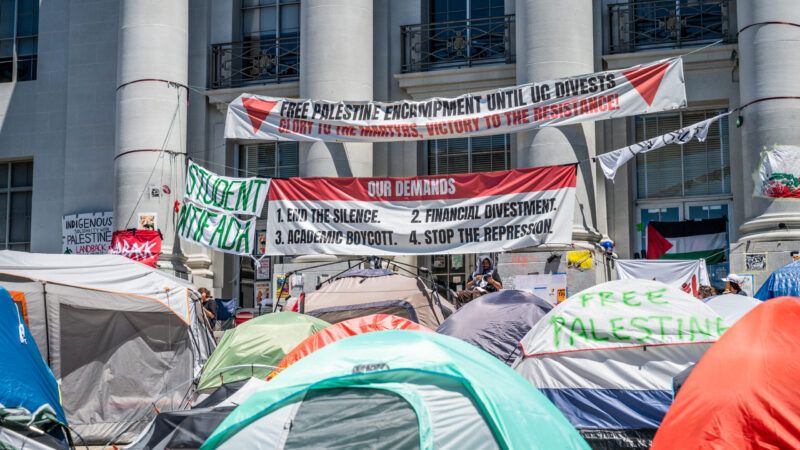Campus Protest Hypocrisy Reveals Need For Student Education on Free Speech
As Israel-Hamas demonstrations continue in the new school year, the misunderstanding of free speech is fueling disruption and hypocrisy on campuses.

With the start of the academic year, campuses across the nation are preparing for more protests over the Israel-Hamas conflict. As students return to campus, the underlying issues that ignited these demonstrations—misunderstandings and misapplications of free speech—remain unaddressed. These protests have revealed a pressing challenge for universities: upholding the principles of free speech amid modern political activism.
While many protests last semester were peaceful, others have disrupted campus operations, led to altercations and vandalism, and made some students feel unsafe on campus. The actions of some students, coupled with the reactions of some administrators, highlight a troubling lack of understanding of free speech principles. Preserving a campus environment that encourages the contestation of ideas, allows dissent, and enables scientific discovery requires a steadfast commitment to free speech principles from administrators and students.
The Sheila and Robert Challey Institute for Global Innovation and Growth's most recent survey of college students nationwide includes important insights on the state of free speech on campus. An encouraging 89 percent of respondents say that students have a right to engage in peaceful protests related to the Israel-Hamas war. However, many students confuse free speech with illiberal actions that undermine it. About 40 percent of students support occupying buildings or staging "die-ins" to prevent normal activities from occurring on campus, 27 percent think students have the right to disrupt class to protest, and 20 percent believe it is okay to shout down a campus speaker addressing the Israel-Hamas war. While these actions may be seen as forms of protest, they hinder the free exchange of ideas and limit the ability of others to express their viewpoints.
This misunderstanding is most pronounced by students who identify as politically liberal and who most likely claim to support free speech (93 percent of respondents do) in the context of the Israel-Hamas war. However, politically liberal students also show the highest acceptance of anti-free speech actions. Among these students, 55 percent think it is OK to disrupt campus by occupying buildings, 37 percent think it is okay to disrupt class with protests, 26 percent believe it is acceptable to shout down a speaker, and 18 percent say it's OK to block a speaker from entering an auditorium where a speech on the Israel-Hamas is scheduled.
Not only are many students confused about what free speech entails, but they also seem to be hypocritical in supporting free speech on some subjects but not others. The apparent enthusiasm for what they consider to be free speech in the context of the Israel-Hamas war is contrasted with a belief by 62 percent of all students—and 74 percent of liberal-leaning students—that professors should be reported for making controversial statements about affirmative action, police shootings, sex and gender, guns, and vaccines. Even worse, 56 percent of all students and 63 percent of liberal-leaning students favor reporting other students for saying something they deem offensive.
The students' confusion about the principles of free speech, and their lack of tolerance for different points of view, pose an important challenge for universities. But it remains crucial for universities to stand firm and defend students' rights to express their views, no matter how distasteful the views may be to any individual. They also need to teach students the limits of free speech: Violence, disrupting campus activities, shouting down speakers one disagrees with, and intimidating or harassing others are not free speech. This commitment to both freedom and responsibility can provide a sense of reassurance and support to the audience.
Recently, a number of universities adopted the Chicago Statement and the Kalven Committee's Report on the University's Role in Political and Social Action—guiding principles produced by the University of Chicago intended to demonstrate a commitment to freedom of speech and institutional neutrality. Harvard University's recent announcement is a significant development. The university declared that neither the school nor its leaders would issue official statements on public matters that would not directly affect its core function. These are important signals of a commitment to free expression on campus, and their recent adoption suggests an awakening to problems of intolerance on campus.
Universities play a critical role in cultivating new ideas and fostering groundbreaking discoveries. To maintain their position as bastions of innovation, it is imperative that they not only adopt but also actively advocate for the principles of free speech. By doing so, they can create a healthy environment where free expression and rigorous debate flourish, preparing students to engage with and contribute to a diverse and pluralistic society.


Show Comments (240)